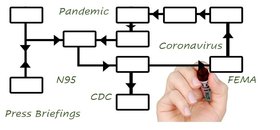The Progressive Case Against OIRA

The White House Office of Information and Regulatory Affairs may be the most important group of bureaucrats many Americans have never heard of. But CPR's Member Scholars and staff keep careful watch on the office of the so-called "regulatory czar." Over the years, the office has come to play an increasingly destructive role in the regulatory process, weakening, gutting, and killing rules designed to protect health, safety and the environment. In this web article, James Goodwin lays out the case for a radical overhaul of OIRA's mission and methods.
Read Online
Author(s): James Goodwin
CPR Comments on EPA's 'Benefits-Busting' Rule

On August 3, 2020, several CPR Member Scholars and staff joined in submitting comments on the Environmental Protection Agency’s (EPA) “benefits-busting” proposal, designed to drastically overhaul how the agency performs cost-benefit analysis on its biggest Clean Air Act rules. The proposal is a thinly veiled effort to rig the results of those analyses – more so than they already are – to make it harder to issue appropriately strong safeguards, thereby sabotaging the effective and timely implementation of the Clean Air Act.
Read PDF
Author(s): Catherine O'Neill, Sidney Shapiro, Amy Sinden, James Goodwin, Darya Minovi
Joint Letter on EPA's 'Benefits-Busting' Proposal

Led by the Center for Progressive Reform, a number of public interest organizations submitted comments to the EPA on August 3, 2020, opposing the agency's efforts to rewrite its cost-benefit analysis methodology as it applies to the Clean Air Act. The "benefits-busting" proposal would tilt the playing field even further than it already is toward industry's profit-making interests at the expense of Americans' health.
Read PDF
Author(s): James Goodwin
EPA Clean Air Act ‘Benefits-Busting’ Rule: Topline Analysis

With the calendar running out of pages on Donald Trump's first term, EPA is pushing hard to adopt its "benefits-busting" rule, hoping to defeat efforts to implement the Clear Air Act's protections by tilting the cost-benefit analysis process ever more to industry's favor. James Goodwin offers an analysis of the effort.
Read PDF
Author(s): James Goodwin
Trail Smelter Arbitration Offers Little Guidance for COVID-19 Suits against China

Writing for Just Security Rebecca Bratspies discusses efforts by Senate Republicans to amend the law to allow lawsuits against China related to the spread of the coronavirus, noting that conservatives have in the past been generally hostile to tort litigation in the past. She goes on to discuss the implications of the Trail Smelter Arbitration between Canada and the United States as it relates to coronavirus disputes.
Read PDF
Author(s): Rebecca Bratspies
The DACA Decision and the Rule of Law

Writing for The Hill, William Buzbee describes the implications of the Supreme Court's ruling against the Trump administration's gutting of the Deferred Action for Childhood Arrivals (Dreamers) program. "The court majority, in an opinion by Chief Justice John Roberts, rejected the Trump administration's brazen efforts to evade judicial scrutiny, while also strengthening the regulatory rule of law fundamentals that the administration has flouted with regularity. This ruling will become central to dozens of pending battles over other Trump regulatory rollbacks," he writes.
Read PDF
Author(s): William Buzbee
Joint Letter with Chesapeake Accountability Project to Maryland Department of the Environment on Compliance During COVID-19 Pandemic

CPR joined with other members of the Chespeake Accountability Project, urging the Maryland Department of the Environment to gather and share information about polluters' alleged inability to comply with permit requirements because of the coronavirus pandemic, and to ensure strong whistleblower protections.
Read PDF
Author(s): Matt Shudtz
The Trump Administration’s Pandemic Response is Structured to Fail

Writing for the Regulatory Review, CPR Member Scholars Alejandro Camacho and Robert Glicksman describe the structural failings of the Trump administration's response to the coronavirus pandemic.
Read PDF
Author(s): Alejandro Camacho, Robert Glicksman
Comments on EPA 'Censored Science' Rule

In comments to the EPA on its proposed 'Censored Science' rule, CPR's Goodwin and Minovi write, "EPA’s rulemaking rejects widely accepted scientific standards and will allow the agency to cherry-pick studies that align with the administration’s agenda ... [and] will be prohibitively costly to the agency, both in terms of taxpayer dollars and the unnecessary and avoidable harms to public health and the environment. Furthermore, the EPA has incorrectly identified ... the legal authority for this rulemaking."
Read PDF
Author(s): James Goodwin, Darya Minovi
Opinion analysis: The Justices' purpose-full reading of the Clean Water Act

Writing for SCOTUSBlog, CPR's Lisa Heinzerling discusses the Supreme Court's April 2020 ruling in a Clean Water Act case from Hawaii. The ruling requires a permit when a point source of pollution adds pollutants to navigable waters through groundwater, if the addition of pollutants is "the functional equivalent of a direct discharge" from the source into navigable waters. She writes that "Perhaps the most striking feature of Justice Stephen Breyer's opinion for the majority is its interpretive method. The opinion reads like something from a long-ago period of statutory interpretation, before statutory decisions regularly made the central meaning of complex laws turn on a single word or two and banished legislative purpose to the interpretive fringes."
Read Online
Author(s): Lisa Heinzerling
